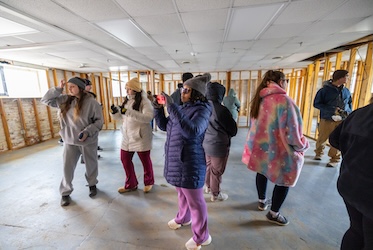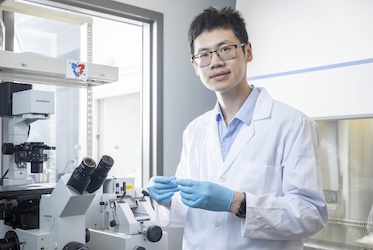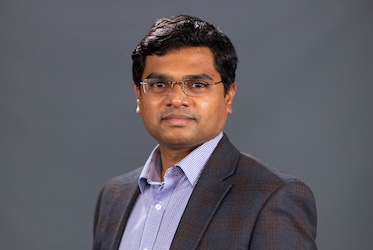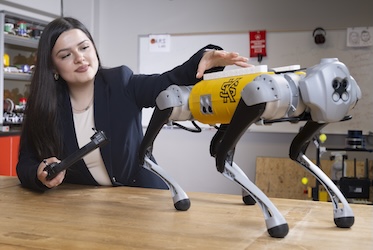
KSU Engineering Professor Uses Data, Simulations to Combat COVID-19
KENNESAW, Ga. | Mar 3, 2021

Universities that encourage their communities to implement social distancing and wear face masks could prevent 99.9 percent of COVID-19 infections, according to a study recently accepted for publication in the Journal of Information Discovery and Delivery.
The study, co-authored by Kennesaw State University assistant professor Lin Li with University of Texas at Arlington assistant professor Yuan Zhou and graduate students, attempted to measure virus transmissions on a college campus using a simulation model, allowing them to gauge the effectiveness of mitigation techniques when used separately and combined with others. Techniques included encouraging social distancing, mask use and shifting courses to an online environment.
“Essentially, we were able to mimic the whole operation of a university down to an individual level,” said Li, an assistant professor in the Department of Industrial and Systems Engineering. “We can take into account which kind of face mask a student prefers to use, their course schedule and how long they are exposed to classmates. As a result, we are provided a great deal of insights into which strategies are most effective.”
The simulation demonstrated that 99.9 percent of infections can be prevented by encouraging social distancing and mask use even if the course modalities weren’t changed. While the results were favorable for the institution in the study, Li cautioned that other universities nationwide could see a different level of infection rates even if the same measures were taken due to a difference in campus layout, course modalities and other variables. Li and Zhou’s study used information from a university composed of more than 40,000 students.
Zhou said the findings are promising considering many universities are already taking the appropriate measures to reduce infections. The study also provides useful implications that could guide universities as they continue to develop operational strategies for future semesters, she added.
“Based on our current simulation model, our next project is scaling it up to a community level to help us develop effective and equitable vaccination strategies to enable in-person schooling provision while minimizing health impact of COVID-19,” Zhou said.
Since joining the Southern Polytechnic College of Engineering and Engineering Technology in 2017, Li has taught operations research, a subdiscipline of engineering that uses mathematical models and techniques to improve the efficiency of large-scale systems. After earning her Ph.D. in Operations Research at Columbia University, she landed research jobs at technology giants IBM and Sabre. Her current research focus is using the combination of data science, social science and decision science to study emerging issues in strategic- and operational-level systems.
– Travis Highfield
Photos by David Caselli
Related Stories

Kennesaw State architecture, engineering students reimagine Asheville's devastated River Arts District

KSU researcher harnessing digital twin technology to improve heart care

Kennesaw State University researcher, students explore clean energy storage solutions

Kennesaw State student exploring the use of robotics in agriculture
A leader in innovative teaching and learning, Kennesaw State University offers undergraduate, graduate, and doctoral degrees to its more than 47,000 students. Kennesaw State is a member of the University System of Georgia with 11 academic colleges. The university’s vibrant campus culture, diverse population, strong global ties, and entrepreneurial spirit draw students from throughout the country and the world. Kennesaw State is a Carnegie-designated doctoral research institution (R2), placing it among an elite group of only 8 percent of U.S. colleges and universities with an R1 or R2 status. For more information, visit kennesaw.edu.














